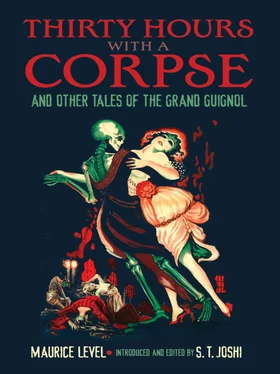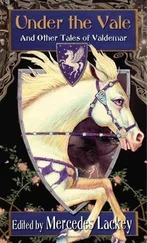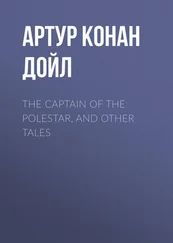“I tell you it’s all lies. Céline is a good housewife, never tired of work; she has everything she wants… Why should she be unfaithful? Why?…”
The old woman made a vague gesture: “Who can tell?”
Changing her tone, she went on:
“Besides, I’m not saying she is… I’m only speaking for the good of both of you. She is young, she likes to amuse herself, to dress smartly, to go to market on Saturdays. Temptation often takes people quickly. At the beginning they see no harm in it. They let someone give them a ribbon, a fichu, a comb for the hair, a watch-chain… And to be able to wear them, they say they were bargains, got for next to nothing… that they picked them up on the road. Perhaps it’s true…”
Every one of the slow words struck into the husband’s brain. He thought of his wife’s return one evening after she had accompanied the master to the town. He pictured her as he saw her the following Sunday with her lace fichu and moiré ribbons. Above all, he saw the gold chain she said she had picked up on the road…
The monotonous voice of the old woman continued:
“It’s not her that I’m meaning, of course! But a husband isn’t always there: he’s in the fields: he goes off to do his month’s military service…”
The man was no longer listening. His two hands crossed on his scythe, his eyes vague, he was absorbed in the recollections that crowded into his mind. All kinds of little incidents gave weight to the insinuations of the old woman: the master, a known libertine, very hard on all his workers, but always particularly amiable to him: the wife coquettish. And suddenly he remembered that in a week he would have to leave for a long month with his regiment.
At the bottom of the field, under the big trees, a call rang out, and raising himself, Jean Madek saw the head and shoulders of his wife emerging from the gold of the plain, and a few steps behind her, swinging his short, thick stick among the corn, the master with his red face and big, shady-brimmed hat.
And a laughing voice cried:
“Here’s the pittance!”
One by one the workers rose out of the corn, sat down under a tree and began to eat their dinner.
Jean sat silent, slowly cutting his black bread into pieces.
“Why are you so quiet, Madek?” said the farmer.
“Are you ill?” added the wife.
“No, but the sun strikes hard. It must have been better in the house?”
The master broke into a laugh:
“You’re about right there!”
The meal finished, everyone lay down for a nap. They would start work again when the sun had lost a little of its ardor. Madek did not sleep. Lying on his stomach, his chin in his hands, he was lost in thought…
As two o’clock struck, the men got up, went back to the field, and once more over the gold of the corn, unruffled by any breeze, there sang the rhythmic sound of the scythes.
When they were all at work the master stretched himself slowly, and in a sleepy voice shouted to the wife of Madek:
“Come and give an eye here, Céline; have you by any chance a needle with you?”
“Yes, master.”
“Then come and put a stitch in my blouse. The cows are in the meadow. There’s plenty of time before you need fetch them. The sun has turned. It’s too hot here just now. I’m going over there under the apple tree. Come to me when you’ve finished your sheaf. Come by the path so as not to beat down the corn.”
They smiled stealthily at each other. But Madek, who was watching, had seen. He made a movement as if to speak, then he lowered his head and went on with the reaping.
The old woman had gone. It was now his wife who was following him. When she had tied up her sheaf he said, without turning:
“Didn’t you hear what the master said to you?”
“Yes, I did…”
“Then what are you waiting for?”
“I’m just going…”
She fastened up her hair, which had come undone while she stooped; and, her two hands flat on her hips, her waist swaying under her bright petticoat, she strolled along the path, a cornflower between her teeth.
He watched her being swallowed up in the verdure as one is swallowed up in the sea, and when she had quite disappeared in the shadow of the apple tree that stood out on the horizon, he set to work again.
His movements had lost their quiet ease of the morning. He went forward in jerks, stopping sharply, then on again, his head lowered, his jaw clenched, an ugly frown on his forehead.
All the old woman had said was fermenting in him like new wine, fizzing in his temples, filling him with a sort of drunken rage. At first there had been doubt; then had followed certainty, which had taken deeper root because of the incidents that had just happened.
He was advancing, and before him he seemed to see his wife and the master laughing and kissing each other in the shadow of the apple tree.
He was advancing, throwing the weight of his whole body into his arms. Behind him the sheaves fell, and the field that his scythe devoured seemed to grow larger. Never in the earliest vigor of his manhood had he been able to work like that.
From a distance, a fellow-worker called: “Are you going to cut it all today?”
Without looking up, he replied:
“Perhaps.”
When he was only a few yards from the apple tree he stopped, listening intently; murmurs reached him. A voice, the voice of his wife, said:
“No… He might be able to see us…”
And another rougher one replied:
“Keep still! He’s at the other end of the field. It’ll be half an hour before he gets here… Come closer!…”
For some seconds he stood as if transfixed, livid under his sunburn; then, with a sharp gesture of decision, he went on reaping. But he had slowed down. The sweep of the scythe was almost noiseless. The wheat fell to the earth without a sound. When he was almost under the tree he heard the sound of kisses. Pulling himself up to his fullest height, with a furious movement he lifted the scythe. The blade leapt up, gleaming white in the sun, came down and plunged… Two horrible shrieks rang out, and two frightful things, two heads, bounded up and fell again, bespattering the stalks that broke with a grating sound…
The scythe flew up out of the corn-waves, all red…
Madek threw it away, and waving his bloody hands in the air, roared:
“Help!… An accident… They were there!…”
IT WAS growing dark, and the beggar stopped at a ditch by the side of the road and looked for a corner where he could spend the night. He rolled himself up in a sack that was his nearest approach to an overcoat, placed the little packet he carried on the end of his stick under his head for a pillow, and exhausted by fatigue and hunger, sank down and watched the stars prick through the dark sky.
The road, which was bordered by woods, was deserted. The birds were asleep in the trees. Away in the distance the village made a big black patch, and a lump came into the old man’s throat as he lay there in the calm and silence.
He had never known his parents. Picked up out of charity, he had been brought up on a farm, but at an early age he had taken to the road looking for work that would provide him with food. Life had been very hard on him. He had never known anything of it but miseries: long winter nights spent under the shadow of mills; the shame of begging, the desire to die, to go to sleep and never wake again. All the men he had come in contact with had been suspicious and unkind. His great trouble was that everyone seemed to fear him; children ran away when they saw him; the dogs barked at his dusty rags.
But in spite of it all he bore no one any ill-will; he had a simple, kindly nature dulled by misfortune.
Читать дальше












